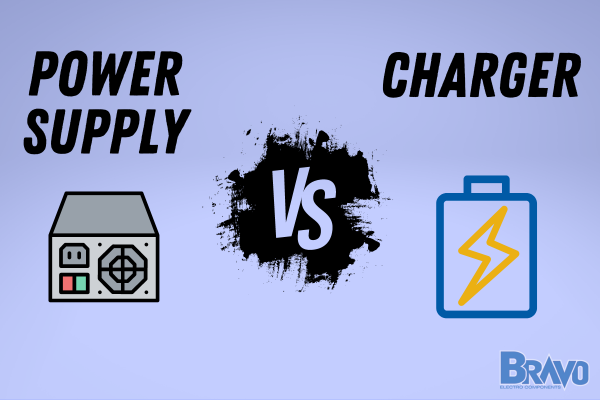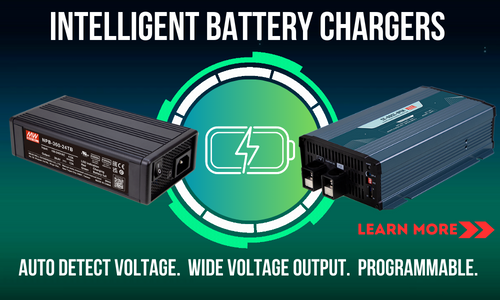
Not sure where you need a better charger vs power supply? You’re not alone, as these two power solutions are constantly confused for one another.
Is there really a difference between a power supply and battery charger, though? And if so, which is right for your specific needs? We’ll help you find out by comparing and contrasting them side by side below!
A power supply converts AC to DC voltage to power devices, while a battery charger does the same but with the added capability to replenish a battery's charge. Understanding the nuances between them is essential for optimal performance and longevity of your equipment.
We’ll leave you feeling confident in which is right for you by the time we finish this comparison guide. But remember - regardless of which aligns with your needs, you can rest assured Bravo Electro has the reliable, efficient solutions you need.
If you’re still left unclear, you can always get in touch with us for a personalized recommendation. Our customer support team is well-versed on this topic and equipped to point you in the right direction. Browse our battery chargers or AC DC power supplies today!
Is There a Difference Between a Power Supply and Battery Charger?
Let’s be clear, there is a difference between a power supply and battery charger. The question is, what exactly is that difference? We’ll offer an overview of each solution below before comparing and contrasting them side by side.
What is a Power Supply (PSU)?
A power supply (PSU) is an essential component that converts alternating current (AC) from the electrical outlet into direct current (DC) that can be used by electronic devices.
It regulates the voltage and current to provide a stable power output, ensuring the connected devices operate consistently and safely. Power supplies are found in everything from computers and industrial machinery to consumer electronics, where they serve as a backbone for operation.
There are many different types of power supplies on the market, ranging from switching power supplies to DIN rail power supplies, modular power supply, and more. Each has its own set of characteristics suited to different applications. You can even choose from an array of power supply voltages:
Across all these varieties a PSU serves a common purpose: to deliver power efficiently. They are often rated by their maximum load capacity, typically expressed in watts.
The quality of a power supply can significantly affect the performance and lifespan of the connected devices, making it a critical component in any electronic system. That’s why individual consumers and professionals alike rely on Bravo Electro for the best power supplies.
That being said, it’s time we unpacked the other half of the power supply vs battery charger debate.
What is a Battery Charger?
On the other hand, a battery charger is a device specifically designed to replenish the charge in rechargeable batteries. It supplies a controlled amount of current to the battery, ensuring that it charges safely and efficiently without overcharging, which can be detrimental to the battery's health.
Chargers are equipped with circuitry to monitor the charging process, adjusting the current and voltage as needed based on the battery's state.
Battery chargers vary in complexity, from simple wall chargers that provide a fixed charging rate to sophisticated smart chargers that can condition and maintain batteries, extending their useful life.
They are tailored to the specific chemistry of the battery they are charging, whether it be lithium-ion, nickel-metal hydride, or lead-acid, among others. We have a guide comparing and contrasting lead acid vs lithium ion battery chargers specifically if you’d like to learn more.
But for now, let’s address one of the most common questions we see asked surrounding the battery charger vs power supply debate: can you use them interchangeably?
Can a Power Supply Be Used as a Battery Charger?
While power supplies and battery chargers may seem similar in that they both provide DC power, they are not interchangeable.
A power supply is designed to provide a continuous supply of power to a device, whereas a battery charger is designed to charge a battery, which will subsequently provide power to a device when mains power is unavailable.
While some power supplies can be modified to function as chargers, they typically lack the necessary circuitry to safely charge batteries.
Charging batteries requires precise control over the charging rate and a full understanding of the battery's chemistry to prevent damage. Therefore, using a standard power supply as a battery charger is not recommended and can be hazardous.
So, which of these is right for your needs between a power supply vs battery charger? Do you need both? We’ll offer tips on choosing the right solution below.
Battery Charger vs Power Supply: Tips on Choosing the Right Solution For Your Specific Needs
Professionals must consider several factors when choosing between a battery charger vs power supply. These range from output functionality to power source compatibility, application flexibility, safety, portability, and more.
Output Functionality
The output functionality refers to the ability of the device to provide the correct type and amount of power to your equipment. This is one of the most important considerations in choosing between a battery charger and power supply.
Power supplies typically offer a stable and continuous DC output, which can be adjusted based on the needs of the device. They are ideal for powering sensitive electronic equipment that requires a precise voltage and current.
In contrast, battery chargers are designed to deliver a charge to a battery, which means their output is not only about voltage and current but also about the charging profile suitable for the battery's chemistry.
Power Source Compatibility
Compatibility with your power source is crucial when integrating a power solution into your existing system. Power supplies usually operate on standard AC mains power and convert this to a usable DC output for your devices. Ensure that the power supply you choose can handle the input voltage and frequency of your local power grid.
Battery chargers also need to be compatible with the mains power but must additionally be matched with the battery type they are intended to charge. Using the wrong charger can result in poor performance or damage to the battery.
Application Flexibility
You should also consider the flexibility of the application when choosing between a power supply and a battery charger. Power supplies are versatile and can be used across a wide range of electronic applications. They are often built with multiple outputs to power several devices simultaneously.
On the other hand, battery chargers are more specialized. They are typically designed for a specific type or size of battery, limiting their use to particular applications. However, some chargers are designed to handle multiple battery chemistries and sizes, offering greater flexibility.
Charging vs Powering Efficiency
Battery charger and power supply efficiency relates to how well each device converts input power to output power without unnecessary waste. This 1) influences your energy bill and 2) affects the longevity of your device and the PSU itself.
Power supplies are engineered to maximize the transfer of power to the connected devices with minimal loss, making them highly efficient for continuous operation. Their efficiency is often highlighted in their specifications. Learn more about DC DC converter efficiency specifically in our blog.
Battery chargers, by their nature, face different efficiency challenges. They must manage the power transfer to optimize battery life while minimizing the heat generated during charging, which can reduce efficiency. They also need to charge fast.
Advanced chargers incorporate intelligent charging algorithms to maximize efficiency by modulating the charging rate depending on the battery's capacity and charge level.
So while efficiency is of the utmost importance for both solutions, this is not necessarily an apples-to-apples comparison. You’ll need to prioritize efficiency regardless of which you choose, and that will involve different considerations.
Safety and Protection Features
Your specific use case will dictate which levels of protection or which specific safeties you need in a battery charger or power supply.
Power supplies are equipped with various certifications such as overvoltage, overcurrent, and short-circuit protection to safeguard the connected devices and prevent damage. These protections ensure that any anomalies in power delivery do not compromise the equipment's integrity.
Battery chargers also incorporate comprehensive safety mechanisms tailored to the specific risks associated with charging batteries.
These include temperature monitoring to prevent overheating, as well as protection against overcharging, which can lead to battery degradation or failure. The best chargers are designed with fail-safes that detect any abnormal conditions and cease charging to protect both the battery and the surrounding environment.
Portability and Mobility
As space becomes more and more of a precious commodity, choosing a compact power supply or battery charger is of the utmost importance.
Power supplies, while often designed for stationary use, are available in compact and lightweight designs for applications where space is at a premium or where they need to be moved frequently.
Battery chargers, however, are inherently associated with portability, as rechargeable batteries are often used in mobile devices.
Chargers range from pocket-sized for consumer electronics to larger, more robust units for industrial batteries. Some chargers are even designed to operate from vehicle power, allowing for charging on the go.
Want to explore other comparisons like this one? Learn about:
Hopefully, this clears up your confusion surrounding the difference between a battery charger and power supply. If not, remember that we’re on standby ready to assess your unique needs and offer a personalized recommendation! That being said, it’s time to reach out or browse our offerings at Bravo Electro.
You Can Trust Bravo Electro Whether You Need a Power Supply vs Battery Charger!
You need a partner you can trust when it comes to powering your projects. Your search ends here at Bravo Electro.
We understand the importance of reliability, whether you're in the market for a power supply or a battery charger. With our top-tier customer service and competitive pricing, we ensure you get the best value for your investment.
Shop thousands of models from the most trusted brands like MEAN WELL, all in stock and ready to ship, so you can count on us to meet your needs swiftly and efficiently.
Our team of engineers is simply the best in the business, standing by to assist with any challenges you may face. Leverage our decades of experience in the power supply, fan, and component industry to your advantage.
We maintain strong relationships with manufacturers to only ensure access to the latest technologies but also secure the best volume pricing for your projects.
Need a tailored solution fast? Our custom power supply program empowers you to effortlessly design something specific to your needs in minutes. If you're unsure of the exact specifications you need, our Power Requirement Form connects you with a Power Expert who will guide you to the ideal solution.
From DC to DC converters to AC to DC converters, battery chargers, specialized power supplies, and more - we’ve got it all. So explore our offerings today and put the stress and uncertainty of power in the past with our expert insights, helpful support, and world-class products!
Bringing Our Comparison of Battery Chargers vs Power Supplies to a Close
There you have it - everything you need to know about power supply vs battery charger. The key takeaway is that each serves its own unique purpose.
Battery chargers are designed to replenish batteries with precision, adhering to specific charging protocols, while power supplies provide a steady stream of power to devices, often with the ability to adjust voltage and current.
Understanding the distinctions ensures you select the right equipment for your needs, optimizing the performance and longevity of your devices.
You can learn more about topics like the various types of DC to DC converter, what is an AC adapter, redundant power supply, power supply replacement, is house power AC or DC, how to tell if PSU is failing, and more.
For unparalleled expertise and a curated selection of both power supplies and battery chargers, remember that you can always trust Bravo Electro to deliver. We're here to power your projects with excellence and efficiency - shop today!










